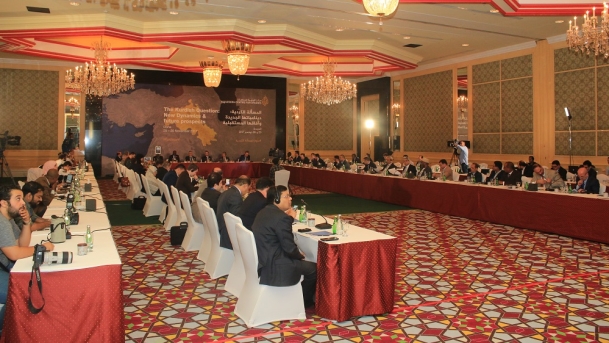
The Kurdish issue has been affected profoundly by the lack of stability in the Middle East. The US invasion of Iraq in 2003 has brought about grave changes to the Kurdish question; and the onset of the Arab Spring in 2011 has given significant impetus to the Kurdish geopolitics of the Middle East. As such, the role of the Kurds has become more prominent in the four countries, of whose social fabric the Kurds are part: Turkey, Iran, Iraq and Syria.
Since the creation of the state ofIraq, conflict has been raging between the central government inBaghdadand the Kurdish movements that have been in control of the northern part ofIraqsince the 1990s. The borders that divided the Kurdish populations of the Middle East across Turkey, Iran, Iraq and Syria have lost their relative significance when it comes to Kurds’ political consciousness, their national project and power projections across the region. In fact, the border between the Iraqi and Syrian Kurds has effectively ceased to exist. This has become a time of political, psychological, emotional and, to some extent, even military interconnectedness among the Kurds. The fight against the Islamic State (IS) in particular has led to the emergence of a Kurdish public sphere in the region. This conference was AJCS’s second event centred on the Kurds. AJCS has also released a number of research papers and analysis reports on the issue.
In the light of the momentous developments in the Kurdish question, the conference was held in order to maintain a genuinely productive discourse on the issue and its implications on the region’s stability and security as well as provide a platform for solutions with the hope of achieving a better future for our region.
The conference explored not only the history, but also the new dynamics of the Kurdish question in the region. It also shed light on the active forces currently influencing the Kurdish question, whether between the various Kurdish groups or between the Kurds and their respective countries. It also investigated its future prospects. Conferees looked into the influences of regional and international players; assessed the successes and failures of the concerned countries’ recent approaches to the issue.
The growing influence of regional and international players on the Kurdish question was also examined alongside the impact of the recent rise of separatist movements around the world on the Kurdish struggle.
Senior politicians, journalists, academics and experts versed in the Kurdish issue in addition to Kurdish key figures took part in the conference.
Session One: The new dynamics of Kurdish question
The first plenary session was chaired by Dr. Basheer Nafi, historian and senior researcher at AJCS, under the title, “The new dynamics of the Kurdish Question”.
One of the speakers in this session was Kifah Mahmoud, a Kurdish journalist and author, who gave an extensive presentation on the history of the Kurdish issue and the trajectories it has taken since the Sykes-Picot Agreement. Mahmoud pointed out that the successive governments in Iraq, without exception, always attempted to create their own pockets within the Kurdish body, namely militias affiliated to the central intelligence service in Baghdad. “The Kurdish Province in the north of Iraq is left between two difficult options: the first is a national state, which is difficult with the religion-based political parties; and the second is a Kurdish state, which hinges on both the economy and the international and regional will,” he stated.
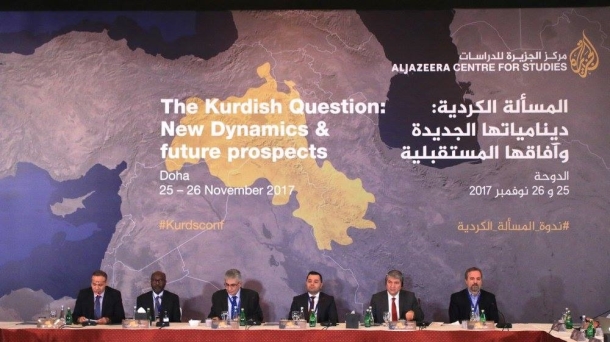 |
| The first session: (from left to right) Ezzeddine Abdelmoula, Salah Eddin Elzein, Basheer Nafi (moderator), Muhanad Seloom, Cemalettin Torun and Louay Safi. [Al Jazeera] |
Mahmoud explained that democracy has always been weak whether in Baghdad or within the Kurdish areas, noting that the domination of a particular constituent over the decision-making process in the Iraqi central government has always been the root of all the current disputes.
The second speaker, Muhanad Seloom, director of Iraqi Centre for Strategic Studies, emphasised that all the states created on the basis of the Sykes-Picot agreement have always victimised the Kurds. “Iran has not given any political or national power to the Kurdish parties in the presence of a mighty central authority,” he argued.
Seloom explained that the aim behind the referendum in Iraqi Kurdistan was to maintain decentralisation and keep the territories disputed over with Baghdad. He added, “The next step will see the Iraqi Kurds engaging in negotiations with Baghdad to reshape the structure of their relations and lay down a timetable for settlement regarding the disputed territories.”
“The current situation brought about by the referendum is not permanent or final as the Kurds may regain control over the areas they had lost. This all depends on the course of negotiations to take place between Baghdad and Erbil and the degree to which the Kurds would lead these negotiations,” Seloom concluded.
On his part, the Deputy Chairman of Foreign Affairs Committee of the Turkish Parliament, Cemalettin Torun, explained that both Russia and the United States are in support of a non-constitutional entity in the northern part of Syria in the post-IS era. He emphasised that such entity will no doubt reinforce the influence of the West in the region.
Torunprovided the historical background of the Kurdish issue. He also shed light on the Kurdish Workers Party (PKK) which was founded in the 1980s on Marxist ideology, and took control over areas to the south of Turkey, which adopted secularism by the end of the Cold War. He also highlighted both the Gulf Wars, the growing influence of the Iraqi Kurds, their autonomy endeavours, and their strong relations with the governments in Turkey and Iran.
Torun concluded by saying that the emergence of Islamist groups with the advent of the Arab Spring was deemed a threat to Israel and the West. As a result, he noted, the West sided with the authoritarian regimes, especially with the eruption of the civil war in Syria.
On his part, Louay Safi, professor of political science at Hamad Bin Khalifa University and senior fellow at the Center for Muslim-Christian Understanding at Georgetown University stated: “The nation state approach contributed largely to what the Kurds have been experiencing. However, the answer lies in a democratic state which permits pluralism.”
Safi advocated for a pluralistic state model where ethnicities are allowed to preserve their own cultural heritage. He emphasised that the Kurds are, by virtue of their experience, able to lead a Rechtsstaat, a state based on the rule of law, along with Arab or other ethnicities.
“The main concern is to establish a state where citizens’ dignity and rights are preserved, and individuals and society are allowed to grow. Unfortunately, outside forces have been manipulating the region’s ethnic and religious conflicts”, said Safi.
He then referred to three established facts about the Kurds: first is their historical ambition for their sovereign independent state; second is that all the post-colonial states ended up being dictatorships that do not take pluralism into account; third is the outside influences and conflict of foreign agendas in the region.
Safi also stressed that the nation state has failed to preserve rights and freedoms. “A central nation state stemming from autonomous provinces requires further discussions, following the utter failure of the central authoritarian state model, which plunged the region into numerous conflicts,” he concluded.
Comments and feedback followed from the audience who emphasised the necessity to recognise the Kurdish cause as a national one: a people with a land living in distress. Conferees reiterated that the Kurdish issue should be dealt with as a reality that requires a solution.
It is also worth mentioning that the Kurdish issue has certain internal aspects relating to the Kurds themselves and other complexities pertaining to the four governments in Iraq, Syria, Iran and Turkey, aside from the international stances towards the issue. It was agreed that the recent referendum has given rise to new dynamics, and the Kurds may one day regain what they have lost today.
Session Two: Revisiting the existing approaches to the Kurdish question
The second plenary session, moderated by Al Jazeera news anchor Mayyada Mohammed was entitled, “Revisiting the existing approaches to the Kurdish question”.
The first speaker, Yasar Nurettin, member of the Turkish Parliament, pointed out that the region is cruising off course and can easily stray away. He explained the difference between the Kurdish political parties representing the community and the separatist ones supported and preferred by outside forces. “The PKK is still seen in Turkey as an ethnic modern secular party; and it has changed the local culture and cultural discourse with its ideology”, he maintained.
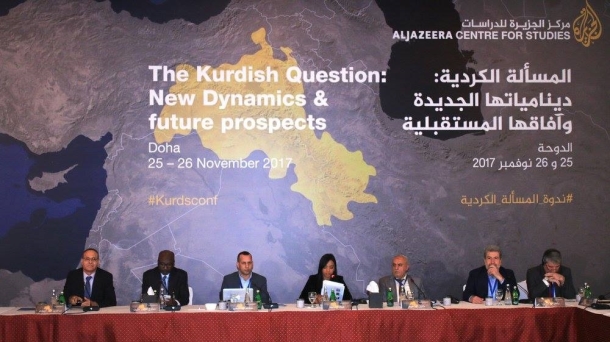 |
| The second session: (from left to right) Ezzeddine Abdelmoula, Salah Eddin Elzein, Mayyada Mohameed (moderator), Khalil Ibrahim, Yasar Nurettin and Cemalettin Torun. [Al Jazeera] |
Khalil Ibrahim, member of the Supreme Authority of the Kurdish Parliamentary Union, provided a chronicle of the Kurdish question and the most significant approaches, both positive and negative, on the basis of which the successive governments in Iraq, Iran and Turkey have dealt with it.
“Being part and parcel of the social fabric, Kurds have always had a role in the region, but have always been met with racist or rather chauvinistic attitudes and, thus, sidelined. Their existence on their land has become an issue and all efforts were dedicated to eliminating the Kurds, not solving their issue”, said Ibrahim.
He explained that the Kurds were forced to assimilate into their respective societies, although their demands were for their culture and rights to be recognised and the injustice done to them be put to an end. The ceiling of their demands was independence.
Ibrahim added that by the second half of the twentieth century, the four countries dealt with the Kurds with force and, in Iraq’s case, murder. “This has led to the absence of trust between the Kurdish movements and the governments that recognise force as the only method of dealing with the Kurds. The establishment of the authority of a central state has always been dominant, which proved best in recent incidents in Kirkuk”, he said.
According to Ibrahim, the said four countries, on some occasions, formed an alliance to throttle the Kurds’ initiative for independence. “This has exacerbated, not solved, the dilemma. The solution is a form of constructive dialogue and responsible stances towards the resolution of the problem”, he concluded.
On his part, Hisham Al Hashimi, Iraqi researcher and expert, pointed out that the disputed territories, over which Saddam Hussein had not been allowed to fly, were under international protection.
Al Hashimi explained that the territories disputed by Kurdistan and Baghdad are in Nineveh, Salahuddin, Diyala and Wasit provinces with a total area of 38,000 square metres, including parts of the Tigris River. These areas contain not only a large part of Iraq’s resources, but also all the components of the country’s social fabric. “These areas have, since the US invasion of Iraq, been controlled by Kurdistan as IS captured large parts of Iraq and the Peshmerga seized the opportunity to liberate these areas. As a result, many of the Kurds have been killed and the borders were drawn, as Barzani said, in blood”, he added.
Al Hashimi concluded that Peshmerga managed to liberate about 28 administration units from IS’s control and put them under Kurdistan’s authority, while Baghdad was busy fighting to liberate Mosul.
Professor and former member of the Iranian parliament, Jalal Jalalizadeh, started his presentation by declaring that the Kurdish question must be dealt with from a legal perspective. “God has created all men equal; and therefore, governments in countries that have Kurdish communities must address the issue positively rather than deprive them of their rights. Kurds are accused of being separatists, which is unfortunate. This problem within the four countries must be resolved on a legal and constitutional basis and without any violence” he added.
Jalalizadeh explained that people in Europe are living in harmony and enjoy a great deal of tolerance away from violence and injustice. “The Middle East cannot endure any more wars especially since IS has wreaked havoc for several years. Constructive dialogue is the inevitable course for the peoples of the region. It is brotherhood in humanity and religion that we need considering that the Kurdish people’s historical and cultural roots are part of the Islamic civilisation”, he added.
Comments followed from professionals and experts among the audience who reiterated that the Kurdish question is not new but deep-rooted in history, geography and demography, particularly since the reshaping of the map of the Middle East in light of the Sykes-Picot Agreement.
Participants in the discussion also highlighted recent developments and new dynamics that have made the Kurdish issue more significant, including the Kurds’ age-old dream of independence. The Arab Spring and the recent failure of Iraqi Kurdistan’s referendum are other factors. History has shown that the military solution to the Kurdish question has always been a failure.
Session Three: The growing influences of regional and international players
The third session was held under the title, “The growing influences of regional and international players”. Professor of Communications at Qatar University Liqaa Maki held that foreign intervention has harmed the Kurds and prevented them from integrating within the nation state.
Maki presented the various forms of intervention in Iraq, starting from the British colonisation that had plundered Iraq’s sovereignty and resources. “The country that was most involved is Stalin’s Russia whose forces seized control of areas with Kurdish presence. The Soviet Union had structured the establishment of the short-lived Kurdish autonomous republic of Mahabad, before it withdrew, leaving Iran’s Shah to terminate it from the very beginning,” he added.
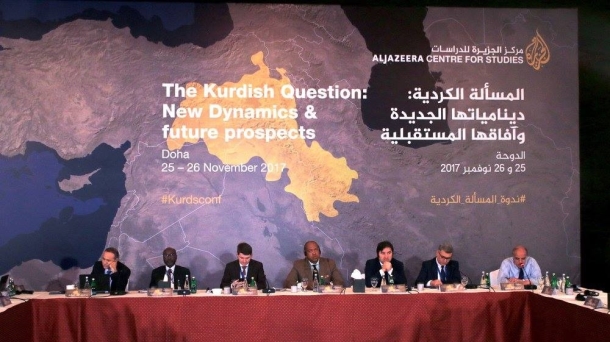 |
| The third session: (from left to right) Ezzeddine Abdelmoula, Salah Eddin Elzein, Leonid Isaev, Thembisa Fakude (moderator), Galip Dalay, Liqaa Maki and Mohammed Cherkaoui. [Al Jazeera] |
“Following the fall of monarchy, an understanding was reached between the Kurdish movement and the Iraqi government, which was close to Moscow then. However, 1971 saw a critical shift: the withdrawal of Britain from the Gulf area and Iran’s occupation of three Emirati islands. Iraq sided with the United Arab Emirates and, as a result, the Shah supported the Kurds in northern Iraq as a bargaining card against Baghdad. Since the 1990s, the Kurdistan Province has been used by foreign Western forces and Israel to pressure Iraq”, said Maki.
Within the same context, Mohammed Cherkaoui, senior researcher at AJCS, pointed out that priority must be given to dialogue, rather than recounting prejudice against minorities and favouritism toward the majority. “To what degree have foreign forces influenced the Kurdish question? Where do the Kurds stand within theUSpolicy in the region? Is the United States’ policy clear in this respect? Is it a single solid policy or multiple inconsistent strategies?” he asked.
Cherkaoui explained that among the complexities of the Kurdish issue is that Iran sees the Kurdish referendum as a US-led Western colonial enterprise; and Turkey is displeased with the US-Kurdish alliance.
He concluded, “Trump’s stances are inconsistent with those of the leading figures of the Republican Party. For example, Republican Senator John McCain holds the Kurds as the most credible in the region. While the Kurds are partners with the United States on the ground, the US Administration does not fully support Kurdish endeavours for independence. The United States is concerned with the repercussions that may spread to Iran and Turkey. Although the United States supports the local government of Kurdistan, it does wish to see it free from the central authority of Baghdad”.
In his explanation of Russia’s position on the Kurds, Leonid Isaev, an expert on Russia’s policies toward the Arab world, pointed out that the Kurdish issue is currently not a priority to Russia, nor was it to the former Soviet Union.
“Russia, no doubt, is dealing with the Kurdish issue based on its bilateral relations with both Iran and Turkey respectively. However, Russia has no long-term strategy towards the Kurdish question, to the contrary of Russia’s policy towards Turkey”, he elaborated.
“Since the 19th century,Russia’s priority has always been the Balkan region. We always wished for good relations with both the Persians and Ottomans, which is no different from today’s situation. That is why Russia does not support the Kurds, but instead has adopted a pragmatic approach towards all the key players in the region”, he concluded.
On Turkey’s perspective, Galip Dalay, Research Director at Al Sharq Forum, explained that the Kurdish issue clearly affects the region. “However, Turkey deems the referendum a regional issue and part of the tensions storming the area. Turkey believes it should deal with the structures of regional states”, he said.
To clarify, Dalay pointed out that Turkey believes the nature of state structure, whether Baathist Arab nationalism or Kamalist Turkish nationalism or even Iran’s Islamic Republic, all have an impact on the Kurdish issue.
He added, “The problem with the Kurds is not the outcome of foreign intervention, but the absence of good governance. However, foreign factors have exacerbated the crisis. The solution does not lie in geography or borders as much as it does in the status and structure of a just government that lives up to peoples’ aspirations and functions according to the balance of powers”.
Iran’s reaction to the Kurdish question is similar to that of Turkey, he noted. “Based on the structure of these two states, the Kurds must realise their concerns: Is independence the only solution? Is sovereignty recognised in the light of the definitions of the 18th and 19th centuries? With what approach should sovereignty be defined? Do citizens enjoy full citizenship rights? Should the regime be national or secular? The answer is governance and political association”, Dalay concluded.
Engaged in the discussion, a member of the audience referred to separatist inclinations and how to deal with them. Others reiterated that the stances of regional states, namely Israel, are of significance and must be addressed.
Session Four: The impact of the recent rise of separatist movements around the world on the Kurdish struggle
The seminar’s fourth session was moderated by Abdalkader Faeez, Al Jazeera Bureau Chief in Tehran. It began with a statement by, Ranj Alaaldin, Kurdish expert at Brookings Doha Center, that the Kurdish question is a very critical issue and must be looked at from a wider perspective, particularly in light of the rise of separatist movements in Britain and Spain.
Alaaldin explained, “This demands us to talk not only about the failures of the social contract between a state and its citizens, but also about national identity. What happened in Britain and Spain cannot be told separate from the challenges related to the global financial crisis of 2008. It coincided with the growing demands of popular movements in Europe”.
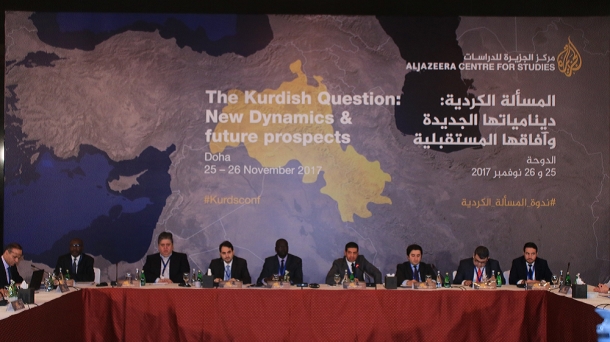 |
| The fourth session: (from left to right) Salah Eddin Elzein, Haidar Saeed, Sinan Hatahet, Aleu Garang, Abdalkader Faeez (moderator), Ranj Alaaldeen, Suleyman Sensoy and his translator. [Al Jazeera] |
“However, the democracy cherished in Europe did not deter the Spanish police from assaulting the Catalonian voters”, he exclaimed.
Alaaldin asserted, “The final say within European states rests with the state institutions, not the rifle. The force of law prevails and it shapes the future of any proposed change, whether aiming at exiting the European Union or shifting towards good governance. This is beneficial not only to the Kurds, but to all the Sunni Arabs”.
“Needless to say, even within the Shiite domain there is a crisis of rule, a crisis of authority; there is a clash between the tribes and the militias over natural resources and wealth”, he concluded.
On his part, Haidar Saeed, researcher at the Arab Center for Research & Policy Studies, referenced the study carried out following the Kurdish referendum. He focused on two key issues: the internal factor and the regional rejection.
Saeed held, “Two lessons can be learned: an internal consensus is necessary and regional recognition is required, not only from Baghdad but also Ankara and Tehran”.
He explained that the global community’s response to the referendum indicated that global powers – not just Baghdad – do not support the move and are not willing to reshape the region’s political landscape.
“Furthermore, the international order does not accept the partitioning of states, unless under an empire, like the Ottoman Empire following World War I and the former Soviet Union. Otherwise, states should remain as the Westphalia system defined them in the 16th century”, said Saeed.
He pointed out that the global order does not easily accept the re-demarcation of borders, but will consider the restructuring of state sovereignty, as it prefers state stability.
“However”, Saeed concluded, “there are a number of factors impacting the Kurdish question, namely the Arab elite’s rejection of multifaceted authority. This requires political agreements and a common vision between the Kurds and the central authority in Baghdad”.
Aleu Garang, coordinator at the Mediation Support Unit, Intergovernmental Authority on Development, noted that the outcome of self-determination is not always secession. “On some occasions, the referendum may result in a self-governance system within an existing state. On others, independence is achieved like in Eritrea, Eastern Timor and South Sudan. Sometimes, people even opt to remain under the mother state, like in Canada’s Quebec Province”, he added.
Garang referred to cases of unconstitutional referenda like the unilateral move made in Abyei. “Although the outcomes were transparent and clear, the referendum was not recognised. So was that ofKurdistan, a unilateral measure. A similar example is Somaliland, which is not recognised within the IGAD region”, he added.
“Unconstitutional referenda are always met with global rejection and regional containment or, at the very least, a sentiment of international listlessness and internal despair that may lead to violence. This is what happened in the central authority’s response in Baghdad”, he explained.
Garang stressed that certain requirements must be met in any referendum: acceptance by the mother state, international recognition of the newly independent state, and no violence resulting from the referendum.
He concluded by saying, “The principle of self-determination must be addressed in all the countries with minorities by resolving the crisis of governance and remedying all grievances”.
In his contribution, Suleyman Sensoy, Chairman of the Turkish Asian Center for Strategic Studies (TASAM), stated that the Middle East region is experiencing radical changes and all the region’s countries will be impacted by all the occurrences, including the Kurdish issue.
Sensoy said, “The world is undergoing a series of partitioning. Early in the 20th century, there were about 20 states; now 194 states are members of the United Nations. This number is estimated to exceed 400 in the near future”.
“History has not been just to the Kurdish cause, which was plagued by successive losses. The Kurds who are struggling to make the independence dream come true must look at their neighbours and wait for history to make room for such a dream. InTurkey, the Kurdish people have earned a number of rights, unprecedented in history,” said Sensoy.
Sinan Hatahet, senior associate fellow at Al Sharq Forum, focused his presentation on the separatist movements in Europe and their influence on similar movements in the Middle East.
Hatahet said, “There is no real threat from the calls for secession in Europe as they represent a small wave compared to those of the former Soviet Union or Yugoslavia. The latter were partitioned into small states. However, it should be noted that the economy has played a key role in fuelling separatist trends in Europe, as the global financial crunch of 2008 raised fears”.
“The separatist movement in the Basque Country was violent and bloody. ETA was engaged in a violent campaign of bombing, assassinations and kidnappings, eventually being classified as a ‘terrorist group’. It calmed down following the 2011 agreement and the Basque Country’s financial independence”, he added.
Hatahet added that most of the members of the Flemish Movement no longer call for the separation from Wallonia and an independent Flemish republic. “The economic factor has helped the Flemish jump on the service-oriented economy’s bandwagon and as a result, the social contract in Belgium has been redrafted; the Flemish have joined the government and Belgium is now a stable state. In contrast, the nation state of the Arab world following the withdrawal of colonial powers was manipulated by a small group that has adopted marginalisation, oppression and dictatorship”, he concluded.
The fourth session ended with comments from the audience, who agreed that the absolute authority of the state has deviated as a concept. Control bodies and other accountability roles are played by the civil society and religious forces limit the state’s traditional authority.
Conferees drew a comparison between the Kurdistan Province and South Sudan and shed light on the differences between the two models. In the latter case, there was a sort of political agreement and the referendum was held under international sponsorship with the consent of the parent state, the region and the international community. These prerequisites were not met in Kurdistan’s case.
Session Five: The future of the Kurdish question in the context of a volatile Middle East
The last session of the seminar touched upon the future prospects of the Kurdish question amid the volatile conditions of the Middle East region. The session was moderated by Salah Eddin Elzein, director of AJSC.
At the beginning of the session, Ali Sarzaeem, professor at the Research Centre of Iran’s Presidency Office, provided an analysis of the crisis’s economic dimension. He stressed that any change must be calculated using profit and loss formula. “In other words, what the pluses and minuses are. So, it should be asked what benefits the Kurdish separatist movement in Iraq would reap, and what losses it would suffer”, he said.
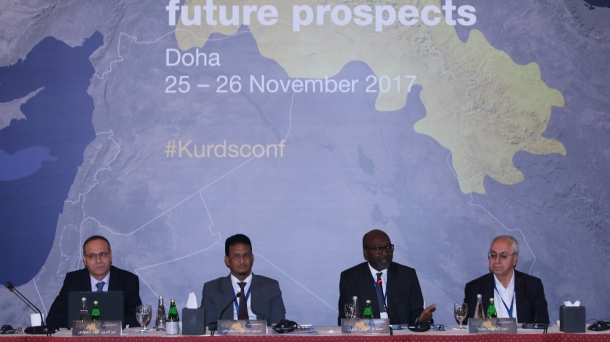 |
| The fifth session: (from left to right) Ezzeddine Abdelmoula, Mohamed El-Moctar Shinqiti, Salah Eddin Elzein (moderator) and Abdul Basit Sida. [Al Jazeera] |
Sarzaeem recounted the economic challenges the Kurdistan Province suffered due to isolation. “If the province secedes, this will affect its relations with Tehran and Ankara. The profit and loss calculations of the four concerned countries should be considered”.
He also raised questions about the concerned countries’ ability to undermine initiatives for secession, and whether a potential coalition would be dependent on their calculations for the secession. Sarzaeem also questioned which of the four countries would be closest to the seceded province. He noted that their collective efforts have to a large degree succeeded in crushing the Kurds’ dream of secession.
Mohamed El-Moctar Shinqiti, professor of political ethics at Hamad Bin Khalifa University, looked at the Kurdish question from a geo-political perspective. He noted that the Muslim world represents an outstanding bloc, which Egyptian scholar and geographer Gamal Hamdan called the ‘Islamic Crescent,’ while Shinqiti finds it resembles the figure of a bird.
To explain, Shinqiti said the elements of power of the said ‘bird’ lies in its head, which represents Turkey, and its wings, which represent Egypt and Iran. “If the three elements of power come together, the bird will soar mightily”, he said.
“The Kurds are present in the bird’s head, breast and eastern wing. Therefore, they carry great significance on the map of the Islamic World”, said Shinqiti.
In light of his geo-political perspective, Shinqiti presented three potential options: forced human and political integration, which is a mistake Kamalist Turkey, Arab national states and post-Shah Iran made. This option is impractical and has adverse impacts.
According to Shinqiti, the second option is total secession, which is neither accepted by the region - although it is the Kurds’ popular demand - nor encouraged by the international community as a whole.
“The third option is multifaceted integration in a consensual context. Throughout Islamic history, the Kurds have always been an element of unity. The key Muslim figure of Saladin had a multifaceted identity: ethnically Kurdish, culturally Arab, and militarily and politically Turkish. This historic image is significant and the Kurds should employ their status to the fullest”, said Shinqiti.
He stressed the necessity to let go of the past grievances, as it was not the Kurds alone who suffered from the manipulation of their normal course of history; the Arabs were promised a nation state by Britain if they support it in World War I, but the British failed to deliver.
“Similarly, the Kurds can form a flexible union within the Muslim World, in which they could establish a Kurdish cultural nation rather than a politically independent state. This cannot be called deprivation; it is an invitation to play an active role in the Muslim world, as in the case of Quebec, and enjoy all the cultural rights without being politically separate as a state”, Shinqiti concluded.
Afterwards, Farid Asasard, director of the Strategic Studies Centre in Kurdistan, held that the circumstances surrounding the Kurdish question demand not only the restructuring of its relations with the central authority, but also the re-arranging of the domestic front. He deemed the referendum an opportunity to do so.
Asasard stated, “We have seen an unprecedented trilateral collaboration – Iraqi, Iranian and Turkish – against the province. It resulted in the stifling of Kurdistan’s already frail economy and the closure of airports. Following Baghdad’s military intervention, the province lost many of the areas that were once under its administration”.
He pointed out that efforts are being made to restore relations between the two parties, but Iraq’s inflexibility and demands are hindering them. “There are talks about negotiations on the basis of the already accepted Iraqi Constitution. This could solve some of the past problems, but if the constitution is applied the way Baghdad wishes, the Kurds’ rights will be undermined”, said Asasard.
“Whether or not the negotiations succeed, certain Kurdish rights cannot be undermined. The issue of disputed areas must be resolved as it is the root of conflict. It is known thatIraqis a federal system and the Kurds represent an electoral power, about 20% of the Iraqi Parliament. This parliamentary power may give the Kurds a role to play in creating the sectarian balance within Iraq. Above all, the referendum paved the way for the emergence of young Kurdish leaders who could restore relations with all the factions”, Asasard concluded.
Abdul Basit Sida, former president of the Syrian National Council, believes that the Kurdish question should be dealt with from the perspective of a researcher, not a politician or a fighter “simply for the reason that a researcher is more objective toward facts”, he explained.
Sida pointed out that geographic, historical and societal injustices have been exercised against the Kurds, which resulted in grievances, tensions and conflicts.
“The Kurdish people was scattered among four countries of different economic cycles, political systems and cultural and lingual contexts. They have been subject to persecution and, on some occasions, genocide, as chemical weapons were used against them in Iraq. They also lived a number of massacres following World War I, including the aftermath of the Sheikh Said Rebellion. However, a positive approach has been seen in the AK Party’s interaction with the Kurds”, he asserted.
Sida concluded that the Kurds are faced with three types of challenges: national, regional and international. “In general, the Kurds’ national enterprise in the Middle East has not provided assurances to all the concerned parties, nor has the region’s nation states to the Kurds. Today, all the parties are required to address the concerns and strengthen trust in order to agree on a mechanism for resolving disputes amicably”, he said.
Taha Ozhan, Chairman of the Foreign Affairs Committee of the Grand National Assembly of Turkey, is of the opinion that dealing with the Kurdish question mandates an in-depth look into the global environment.
Ozhan referred to the events in Europe that suggest an inclination to leave the all-inclusive system. “Britain has left the European Union, and Catalonia is seeking secession. In addition, the United States is also seeking an exit from certain blocs. There is a concerted endeavour to break down systems in many areas due to the feeling that centre is in total control of everything, forcing the peripheries to submit”, he added.
“The Kurds’ endeavour for independence is not a coincidence, so we have to consider the core reasons. In general, there is a heavy price to be paid, not only by the Kurds. Political history shows that since the Sykes-Picot Agreement, the Kurds, Persians, Arabs and Turks have been together, and have had a history rife with crises but the former have not yet reached maturity”, said Ozhan.
According to Ozhan, the geopolitical crisis in Syria and Iraq caused the Kurds to visualise a farfetched dream of establishing an independent Kurdish state, which deepens divisions. He concluded that the entire Kurdish issue has not developed enough.
The last session culminated in an open discussion between the panellists and the audience on the future prospects of the Kurdish question amid the changes storming the Middle East.